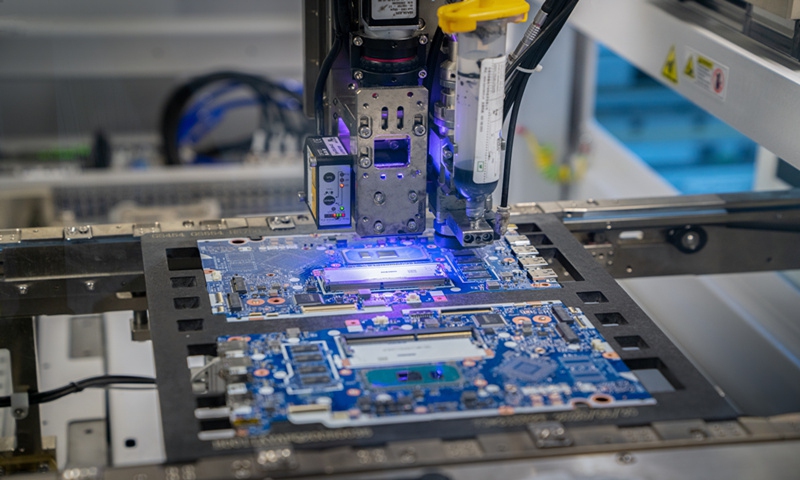
A chip manufacture machine Photo: VCG
The Biden administration is reportedly working on a set of unilateral restrictions on China's access to artificial intelligence (AI) memory chips and equipment capable of making those products, in the latest hegemonic move to contain China's AI industry in order to maintain its global monopoly.
Chinese observers said the US cannot impede China's technological progress and will only impel Chinese enterprises to strive for technological self-reliance. They said China may take countermeasures, including lodging complaints with the WTO, when it is necessary to fight back as the US continues to expand its "small yard" policies.
Observers said the US' intensifying crackdown on and "decoupling" from China will lead to further deterioration in China-US bilateral relations, bringing monumental losses to US firms that are betting on Chinese opportunities.
US' stepped-up restrictionsBloomberg reported on Thursday that the Biden administration is expected to announce a set of new restrictions as soon as late August to curb China's access to AI memory chips and related equipment.
The measure is designed to keep Micron Technology Inc and South Korea's leading memory chipmakers SK Hynix Inc and Samsung Electronics Co from supplying Chinese firms with so-called high-bandwidth memory, or HBM, chips, the report said, citing people familiar with the matter. HBM chips are required to run AI accelerators like those offered by Nvidia Corp, it said.
"By putting patches on its chip export restrictions on China, the US' ultimate purpose is to curb China's technological development so as to maintain its global monopoly in cutting-edge technologies," He Weiwen, a senior fellow at the Center for China and Globalization, told the Global Times on Thursday.
He said the US' political maneuvers are not sustainable, as they go against economic rules and the interests of US enterprises and residents.
"China may take countermeasures when it is necessary," He said, noting that China could also lodge complaints with the WTO if the US' restriction measures against China reach a certain scale.
At a routine press conference on Wednesday, Chinese Foreign Ministry spokesperson Lin Jian blasted the US for continuing to politicize trade and tech issues, tie them to national security and use them as a weapon to tighten control over chip exports to China and coerce other countries to go after China's semiconductor industry, which severely undermines international trade rules, destabilizes global industrial and supply chains, and serves no one's interests.
The Biden administration is taking an increasingly hardline stance on China issues in the election year. In June, the US Treasury Department issued draft rules for banning or requiring notification of certain investments in AI and other technology sectors in China that could "threaten US national security."
Lü Xiang, a research fellow at the Chinese Academy of Social Sciences, warned that the US' intensifying crackdown on China's technological rise may further harm China-US relations and send bilateral relations to a new low.
In addition, the US' attempts to crack down on China will backfire on itself and its allies, Lü told the Global Times on Thursday.
"For example, South Korea and Japan previously exported a large number of semiconductor products to China every year, but the US' export restrictions led to South Korea posting a trade deficit with China. The US' selfish moves will harm its allies' production capacity, and will prompt those countries to resist the US' coercion one day," Lü said.
China market indispensable"For US, tightening chip export controls on China is a double-edged sword," Fu Liang, a Beijing-based tech analyst, told the Global Times on Thursday.
Faced with external pressure, Chinese chip producers are accelerating research and development to boost domestic replacements, which means medium- and low-performance US chip products will become increasingly insignificant for the China market, Fu said.
Despite the Biden administration's continuous crackdown on China's high-tech field, US firms such as Nvidia are striving to tap the great potential of the huge market of the world's second-largest economy.
Nvidia is reportedly working on a special version of its AI chip for the China market. Nvidia will work with Inspur, one of its major distribution partners in China, on the launch and distribution of the chip, which is tentatively named "B20," and the shipments are planned to start in the second quarter of 2025, Reuters reported in July.




